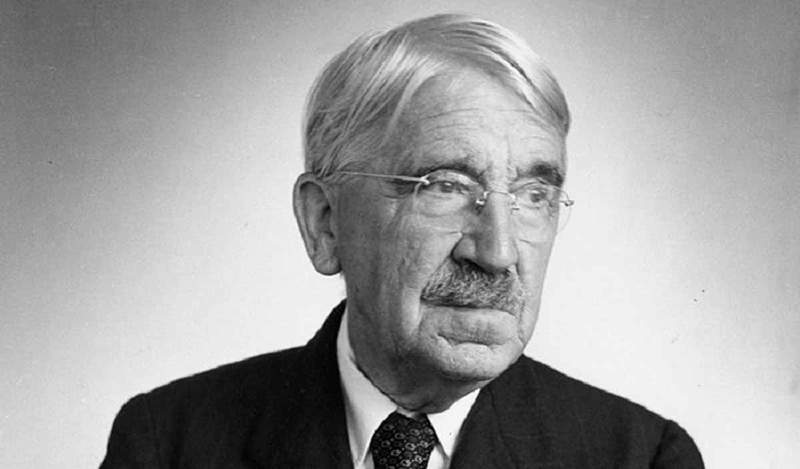Biography of John Dewey (1859-1952)

- 1646
- 516
- Hugh Greenholt
John Dewey was born in Vermont, United States, on October 20, 1859 and has been one of the most notable figures within philosophy. In addition to having been a philosopher, he was also a pedagogue and a psychologist of great relevance.
John Dewey is one of those authors who are studied in many areas of knowledge, thanks to the great contributions he made, he has been considered as the most important American philosopher of the first half of the twentieth century, in addition to Charles Sanders Pierce and William James.
John Dewey's biography
John Dewey is one of the most prominent figures of the so -called progressive pedagogy in the United States. Although he is known for his contributions to education, the truth is that he also wrote treaties about logic, art, ethics and democracy, because, from his thinking, Full democracy could only be achieved through education.
At present, the influence of John Dewey's thinking is still in force, although he is criticized by fundamentalist conservatives, although he is considered the precursor that inspired the party reforms of the child -centered teaching.
John Dewey was born in Burlington, a city of Vermont, was the son of a merchant. He graduated at the University of Vermont in 1879 and then continued his studies of philosophy at Johns Hopkins University, where he had the opportunity to prepare his studies based on the German model.
In 1884 he obtained his doctorate with his thesis on the psychology of Immanuel Kant and later occupied the direction of the Department of Philosophy of the University of Michigan.
In Michigan he met who would be his future wife, one of his students, Alice Chipman who always supported Dewey to follow his inquiries in educational issues actively collaborating with him.
In 1884 he moved to Baltimore and enrolled at Johns Hopkins University, where he was strongly influenced by Hegelian ideas. Similarly, he also obtained influence of Kantian ideas. In 1894 he moved to the University of Chicago, where his interest in education was definitively reflected.
In 1900 he assumed the teaching of the pedagogy course at the University of New York, which was premiering his pedagogy school. But, in 1904, John Dewey resigned from his position as a professor, exercising this role for the last time at Columbia University. At 87, John Dewey married for the second time and adopted two children.
Notably defended the rights of women's equality, advocating the right to female vote. He was co -founder of the League for an independent political action, promoting teaching trade unionism and supporting the intellectuals who exiled because of the totalitarian regimes.
John Dewey was a fundamental pillar in the development of pedagogical progressive.
He died on June 1, 1952, at the age of 92, but his contributions will remain forever in the history of philosophy, pedagogy and politics.
Its position regarding education
It should be noted that at that time what happened worldwide was the colonization of new territories, the mobility of US borders, social permeability, democratic way of life, as well as the relativization of principles. So, among their theoretical proposals, some stand out, for example, from the epistemological point of view, Dewey considered that the concepts formed were provisional human constructions, So criticized the traditional approach to concepts.
The main concept, in terms of his theory of knowledge, came from experience, which occurred continuously given the interactions between beings and the conditions that surrounded him. Likewise, John Dewey maintained a dynamic conception of the person, proposing the reconstruction of social and moral practices, in addition to beliefs, being philosophy that should undertake a critical task on the beliefs, meanings and values that were already instituted.
In your text Religion and Our Schools (1908) proposed that public schools should not teach religious education, since this generated divisions and conflicts in a society characterized by plurality.
From its perspective, progressive education should be opposed to traditional education, so Dewey rejected education as preparation, as training of the faculty, as a development and as training. For John Dewey, The school should be conceived as a reconstruction of the social order, in which the educator fulfilled a guide and counselor for his students.
Biography of Sigmund Freud (1856-1939)
Bibliography
- Bernstein, r. (2011). Philosophy and Democracy: John Dewey. Editorial Herder.
- Dewey, J., & Pineda Rivera, D. TO. (2011). John Dewey: Text selection (No. 370.1 P653J eg. 1 024829). Editorial University of Antioquia.
- Dewey, J., Llavador, j. B., & Llavador, F. B. (1997). My pedagogical creed. University of Leon.
- Dewey, J. (1928). How we think. Reading editions.
- « 6 duel models for better understanding
- Misokinesia, when the restless movement of others alters us »

